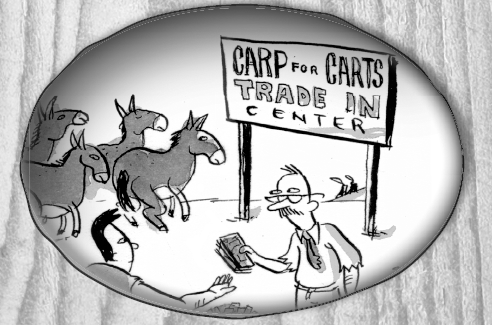
Despite the bailouts and incentives made by Bass and Plankton, the Usonian economy continued to deteriorate during the Great Hut Rut. Strangely, no one showed much interest in buying new huts. Instead of spending their stimulus fish, some islanders elected to save them. With spending stagnant, the cart companies teetered on the edge of extinction. Hut Depot was devastated. Unemployment got worse. Public dissatisfaction intensified.
The next election proved to be pivotal. Barry Ocuda, a candidate for Senator-in-Chief, accused the Bass faction of inadequacy in the face of a national emergency. He pilloried the Bass moves as trifl ing half measures. Campaigning on a theme of transformation, Ocuda promised much greater government efforts to turn the island's economy around.
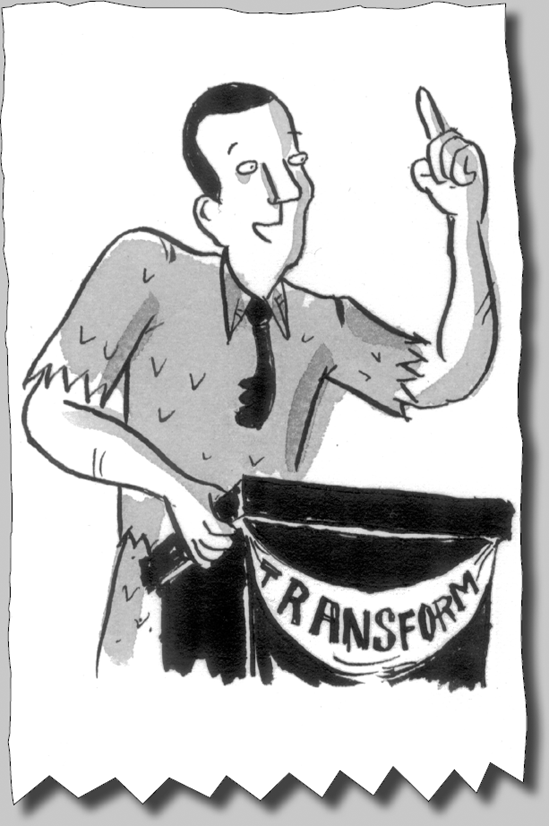
Taking power, the young Senator-in-Chief got to work, and transformed the Bass policies by tripling them in size! He devised a number of new programs to push newly printed Fish Reserve Notes into the economy.
He increased the amount of assistance that the government would give to hut buyers—initially just to first-time hut buyers and then to trade-up buyers as well. And, once again, he lowered the interest rates that Finnie and Fishy charged.
Noticing that the surfing school attendance had fallen off dramatically, he increased direct aid to schools, and made student loans even easier to get.
He authorized the building of a new lighthouse at Shady Swamp. When engineers pointed out that the facility was not entirely needed, Ocuda reminded them that the construction jobs alone would provide a powerful boost to the economy.
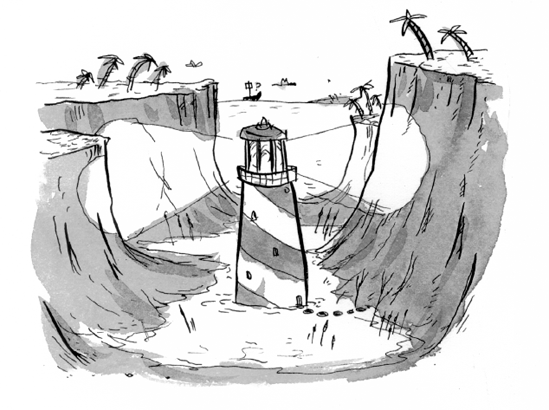
Ocuda, also placed much faith in the need to develop alternative energy sources. He argued, "Society has become too dependent on donkeys. Llamas are far better suited to the island's climate and topography. Not only do llamas consume less grass, but they are far surer footed, have better dispositions, and reproduce with more frequency than traditional donkeys. To top it all off, llama manure is far less offensive to the senses."
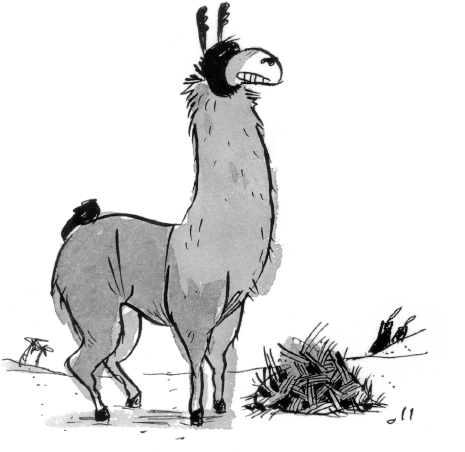
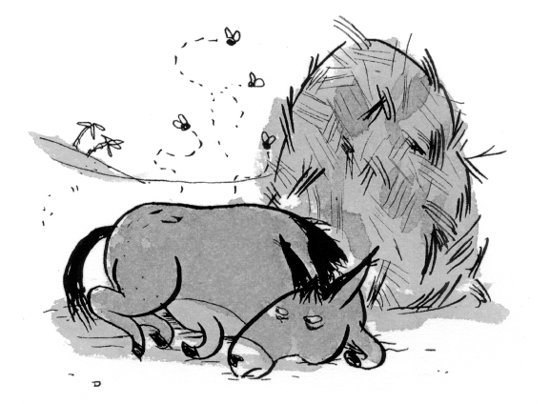
Ocuda envisioned a multistage plan to transform the old economy.
First, he would hasten the adoption of llama-based infrastructure through massive stimulus spending. To this end, he called for an aggressive state-run llama breeding program. He also mandated that manufacturers (now run by the Senate directly) redesign and refit the carts for llama use. Last, he set about resurfacing all the island's cart paths with a topsoil better suited for llama feet.
Second, Ocuda also came up with the "Carp for Carts" program, which offered government incentives to get people to turn in their grass guzzlers for more fuel-efficient carts. (This was great news to the Sinopian cart companies that made most of the smaller vehicles.)
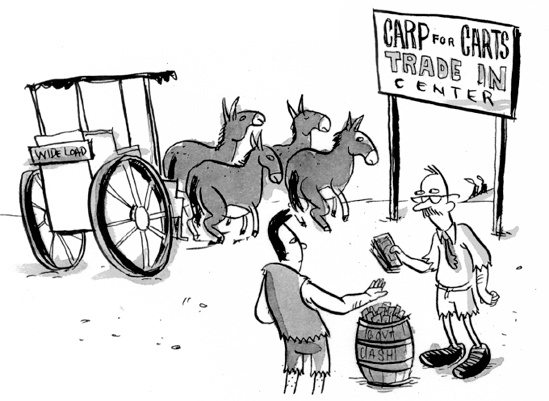
As Ocuda and his senatorial ally, Nan ShallowSea, prepared to spend piles of newly printed Fish Reserve Notes, there was one small detail that they overlooked: Usonia was completely out of fish. All their planned spending had to be financed from abroad.
Solely as a result of the willingness of foreigners to trade real goods for paper, Usonians had been able to consume more than they produced. In reality, their current choices were simple:
Consume less and use the savings to pay back debt.
Produce more and sell the extra goods to pay back debt.
Borrow more to continue current levels of consumption.
The first two choices involved unpleasant outcomes for Usonians. Either they would be working harder, eating less, or both. The third choice dealt all the sacrifice to foreigners. Not surprisingly, the senators courageously chose to ship the pain abroad. In so doing, they hoped the renewed spending would restore economic health at home.
The unemployed knew that jobs were being created in Sinopia as fast as they disappeared at home. This resulted from Sinopia's Fish Reserve purchases, which pushed up the value of Fish Reserve Notes and made Sinopian products cheap and irresistible. As a result, Ocuda and ShallowSea publicly lobbied for the Sinopians to dial down their purchases, which would allow Fish Reserve Notes to lose value and make Usonian products more competitive.
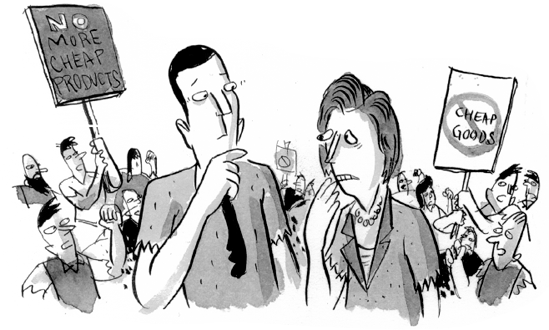
Of course, no one had any idea how Sinopia could simultaneously lend the fish necessary to finance the spending envisioned by Ocuda while rolling back the Fish Reserve Note purchases that were the means of the funding. No one even bothered to ask the question. Even while they prepared to borrow more than they ever had before, the senators forgot that someone had to do the lending.
On the other side of the ocean, the Sinopians were not nearly as enthusiastic about the senators' plans. Things started to get a little unsettled when the workers got wind of how many more real fish they would be asked to devote to buying Fish Reserve Notes.
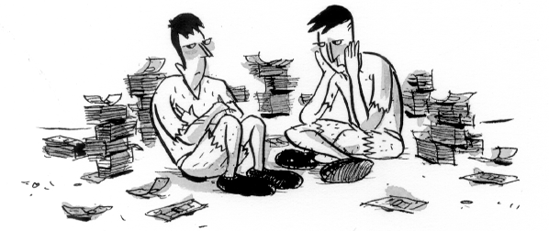
Most Sinopians were frustrated with working so hard and getting so little. Since their own government did not provide the social safety nets available in Usonia, the average Sinopian saved lots of money just so they would not be hutless and fishless in old age. Everyone worked, no one had a donkey (let alone a cart), and hardly anyone surfed. Even if they did, they usually went four or five to a board.
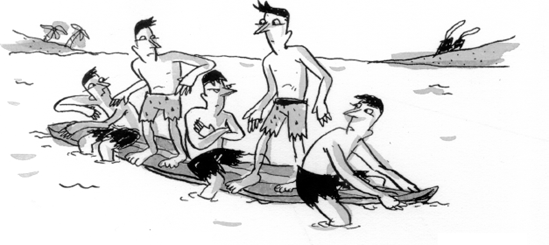
The Sinopian king was also losing enthusiasm for the arrangement, and was particularly vexed by the staggering spending plans announced by Ocuda. His advisors, many of whom had been students of the great Ally Greenfin, began to worry that their cache of Fish Reserve Notes would lose value if they stopped buying. And if that happened, Usonians would no longer buy as many Sinopian products.
They argued that without Usonia's thunderous demand, their own export factories would shut down, causing unemployment, discontent, and perhaps even protest (which had never been allowed in Sinopia). Caught on the horns of a dilemma, the Sinopian king kept the status quo going and hoped for an answer.
One day, while he was deep in thought and his council of economic advisors was away on a research expedition, a simple peasant slipped past the palace guards and engaged the worried king in conversation.
"My most glorious leader, please forgive the intrusion, but I hear that you have been troubled by thoughts of fish. Perhaps I may be able to help."
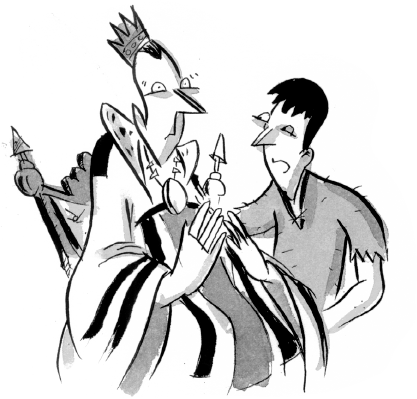
"These are great matters involving trade, savings, investment, and planning. What can you know of such things?" thundered the king.
"Very little, I am sure," conceded the peasant. "But I know that in my village, we all make nothing but wooden bowls, which we send across the sea. In exchange, we get paper, which we save for the future. Someday we hope to buy things with the paper, but now there is little. As we send away our bowls, we wonder why we have no bowls ourselves. We still eat our fish off the floor. Most unsanitary. Would it not be simpler if we just made bowls for ourselves? In that way, our work would improve our lives."
"That's absurd," said the king. "Our people would starve without our exports. How else could we run our economy?"
"Well, my king, as I said, we are good at making bowls. And since—under your wise leadership—we are catching so many more fish, all we need is to find someone here at home who would trade their fish for our bowls. Then all of our productivity would stay here, and our people would have more bowls and more food to put in them."
The king was puzzled. "But wait, the Usonians are so much wealthier than we. How can we compete with their citizens to buy the products we make? They can afford to pay more. They have the Fish Reserve Notes."
"Begging Your Majesty's pardon, but I don't see why we need their notes. They have value only because of our fish and our bowls. We have made the products, so of course we can afford them. We just have to stop giving them away for nothing."
Somehow the simplicity of the peasant's words made a profound impression on the king and he decided to change the policy. No more purchases of Fish Reserve Notes. From now on Sinopians would trade their goods only for real fish!
Since he was uncomfortable with the fast change that the peasant seemed to advocate, the king decided on a gradual course. After all, the king had plenty of bowls, none of which were made of wood.
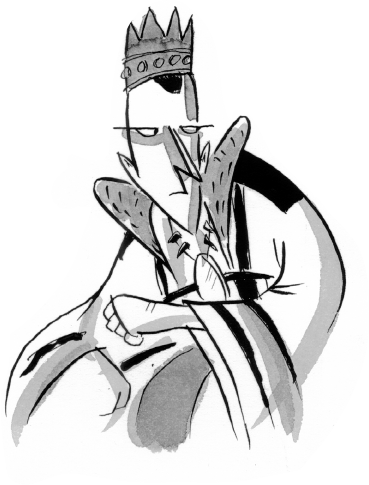
As a result of a few quarters of positive gross domestic product figures, economists now tell us that the Great Recession is over. But with unemployment still more than 10 percent, and underemployment (those who have given up looking or who work only part-time) still more than 17 percent, many Americans would be surprised to hear the good news.
In truth, the Great Recession had begun the painful, but unfinished, work of rebalancing our economy. In 2009 our national savings rate ticked up for the first time in years, and our trade deficit finally began to shrink after its dizzying ascent earlier in the decade. But the Bush and Obama stimulus programs put a stop to this. The creation of ever greater quantities of debt has given us a reprieve from the process of returning to living standards commensurate with our productivity.
But at some point in the foreseeable future, perhaps in the next few years, we will have a very ugly encounter with our debt. Thus far we have dodged the bullet. Unfortunately, due to our growing annual budget deficits and the looming bankruptcies of Social Security and Medicare (caused in part by the demographic shift of retiring baby boomers), the bullets will be coming at us with much higher force and frequency.
Washington has shown absolutely no willingness to confront the problem. The ability to make significant cuts in government spending has never been considered, let alone attempted. In the early days of his tenure, President Obama made a theatrical show of going through the $3 trillion federal budget "line by line" in order to find "wasteful spending." This resulted in a paltry $17 billion in savings, less than one-half of 1 percent of the budget. Even those proposed cuts elicited howls of protest by both Democrats and Republicans.
If our government won't impose financial discipline, then our creditors, most notably China and Japan, eventually must. Although there are many forms in which this discipline could be delivered, the most likely method is that they simply stop buying our debt.
For now they have fallen into the same trap as the Sinopians. Once they realize that the continual extension of credit to a customer that can't pay is a waste of resources, they will change course. At that point they will refocus their productivity on domestic consumers, who will then fully enjoy the fruits of their labor.
For now, despite increased grumbling and calls for international monetary reform, those nations have kept lending. But their stamina can't be everlasting.
With more than 50 percent of our government debt currently sold to foreign governments, who will pick up the slack when they stop buying? With very little domestic savings to tap into, Americans alone won't be able to do it.
When that day comes, we will have two choices: default or inflation. Both options will violently force American living standards downward through lost purchasing power and higher interest rates.
